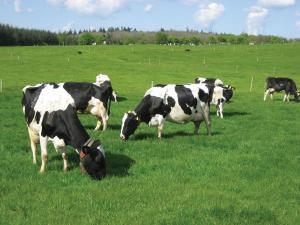AFBI launch a new bovine respiratory virus PCR test
Date published:
In Northern Ireland, the arrival of the winter months often sees a spike in respiratory disease among the cattle population, precipitated by stress of housing and mixing of animals, with young animals at greatest risk of serious disease.

Respiratory disease is estimated to cost the UK cattle industry £80 million annually. An accurate diagnosis of the cause(s) of respiratory disease is essential so that the correct treatments are given and that steps can be taken to prevent future disease using appropriate vaccines.
To aid farmers and vets to control respiratory disease AFBI is now offering PCR testing for all the major respiratory disease viruses in cattle - Bovine Respiratory Syncytial virus (BRSV), Infectious Bovine Rhinotracheitis (IBR) and Parainfluenza virus type 3 (PI3). These viruses can cause disease by themselves or damage the defense mechanisms of the respiratory tract and predispose to secondary bacterial infections of the lungs.
BRSV is recognised as a major cause of respiratory disease problems usually in calves under 2 years old. The disease, as a primary infection, causes significant economic losses in livestock farming and its impact is particularly significant in autumn and winter. The spread of infection is facilitated by crowding and mixing of animals and the peak risk period is when animals are housed during the winter months. Initial symptoms of the disease include elevated temperature, coughing, discharges from the eyes and nose. As the disease progresses animals go off their feed; the breathing rate increases and becomes more laboured which in turn may lead to death of the animal. BRSV is transmitted horizontally by direct contact with respiratory secretions (aerosol infection).
Infectious Bovine Rhinotracheitis (IBRV) is a severe respiratory infection in cattle characterised by infection of the upper airways and fever caused by bovine herpesvirus type 1 (BHV-1). Affected animals go off feed, become depressed and slow to rise, and often stand with the head lowered. The disease also causes a purulent discharge from the eyes and nostrils. Occasionally, it can also cause reproductive organ infections in both male and female cattle, leading to abortions and in rare cases, encephalitis. IBRV is transmitted horizontally by contact with respiratory, eye and reproductive secretions.
PI3 results in moderate clinical signs if there is no secondary infection. PI3 acts as an immunosuppressive, predisposing animals to secondary infection and reinfection. As with BRSV the PI3 virus is transmitted by aerosol infection and by direct contact with respiratory secretions.
AFBI’s new, highly sensitive, rapid test, can be performed on the following sample types (1 from any of the below per animal):
- Nasopharyngeal and tracheal swabs, preferably in transport media (no charcoal swabs)
- Nasal mucus.
- Bronchoalveolar lavage fluid.
- Fresh respiratory tissue samples.
- Trans-tracheal aspiration.
Not only is this of benefit to vets and farmers but it will also enhance the animal disease surveillance work carried out by AFBI across Northern Ireland.
AFBI also offer an existing PCR test for Bovine viral diarrhoea (BVD). See website for details.